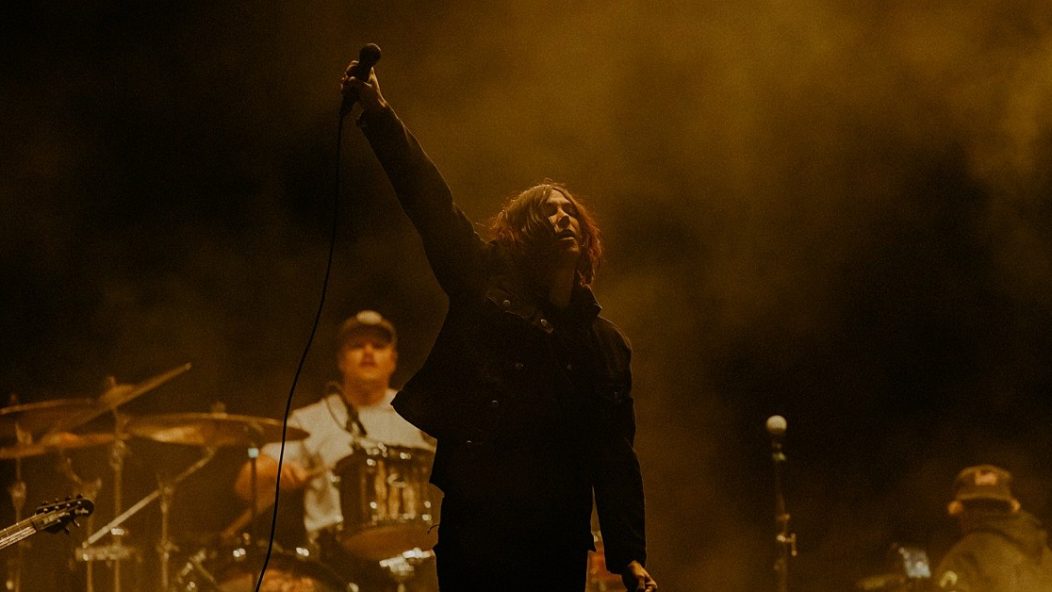
Every Sleeping With Sirens album ranked: From worst to best
Ever since their formation in 2009, Sleeping with Sirens have distinguished themselves, thanks to the vocals of Kellin Quinn, which soar well into the fifth octave, and their brutally honest songwriting. Their seven studio albums cover a plethora of issues such as addiction, broken families, and mental health.
The band have an extensive history of making post-hardcore music, with an attempt to branch into the pop-rock world before going back to what they do best. Their verse progression is somewhat muted, allowing soaring, melodic choruses to become their signature. Simply put, SWS write with style and skill.
Read more: Every A Day to Remember album ranked: From worst to best
Below, we’re ranking Sleeping with Sirens’ albums, from worst to best.
Gossip (2017)
Gossip lacked any genuine originality, as it’s a pop-rock record that doesn’t accomplish anything particularly notable. Given the time period, when bands like PVRIS and Paramore were evolving their sound, it’s understandable that SWS wanted to try something new. Even though Quinn’s vocals were given the opportunity to shine, there was no real atonement for Gossip due to generic lyrics and lackluster instrumentals. If it’s not broken, don’t fix it.
Madness (2015)
Madness, the predecessor to Gossip, foreshadows the sharp change SWS would attempt in 2017 while still adhering to their popular, distinctive sound. Madness is a sing-along record featuring songs like “Go Go Go” and “Save Me A Spark” focusing on the pop-rock sound, whereas others like “Kick Me” and “Better Off Dead” used post-hardcore techniques. Quinn’s vocals seem muted on every track, creating a disjointed appearance from the clean-cut instrumentals. Although the album stays true to their writing style, it was obvious that the band were leaning into the idea of incorporating pop music into their post-hardcore sound.
Feel (2013)
After the success of their two previous records, Feel is SWS’ first venture into alternative pop rock. Smooth riffs and a less aggressive approach to their sound make for a less intense listening experience. The engineering on the album is excellent, with clear, forward guitars and an emphasis on the rhythm section. SWS consistently put out well-thought-out records, as the flow and conception of the album work well. While songs like “Here We Go” and “Low” embrace the raging guitars and dramatic percussion on this album, tracks like “Free Now” and “These Things I’ve Done” balance out the aggression with smooth riffs and melodies.
Complete Collapse (2022)
Complete Collapse is a solid post-hardcore record. Quinn and guitarist Nick Martin both contribute screaming vocals that draw on the foundations of SWS. Here, the band seem to have figured out how to incorporate some pop elements, like synthesizers and backtracks, into their sound without completely obliterating the instrumentals. The title track and “Bloody Knuckles” are two notable songs on the album that contain catchy choruses and strong hooks. Meanwhile, “Crosses” (feat. Spencer Chamberlain of Underoath) and “Ctrl + Alt + Del” showcase SWS’ distinctive post-hardcore sound. There’s a decent mix of tempos and influences, without feeling completely disjointed.
With Ears to See and Eyes to Hear (2010)
With Ears to See and Eyes to Hear was SWS’ iconic debut record. Before their guitarist Jesse Lawson eventually took over screaming duties, Quinn’s attempts were introduced to the world. Quinn’s vocals are most comfortable in the tenor range, and his vocals are capable of stretching to lower tones. The passionate lyrics underline Quinn’s transparent songwriting and is paired with fast tempos and strong basslines. This album doesn’t contain any of Quinn’s discussions about mental illness, addiction, and broken homes; instead, he favors romantic, relationship-focused lines. “You Kill Me (In a Good Way)” and “In Case of Emergency, Dial 411” contain great melodies, and “If I’m James Dean, You’re Audrey Hepburn” and “Captain Tyin Knots VS Mr Walkway (No Way)” embody the revival of post-hardcore in the early 2010s.
Let’s Cheers To This (2011)
Let’s Cheers To This put Sleeping with Sirens on the post-hardcore map. With infectious melodies and major guitar riffs, Quinn’s resonant vocals are enough to stick out of the bass- and guitar-heavy arrangements, punching through the rest of the instruments. He has a high-pitched timbre that makes it easy for everyone to recognize. SWS established themselves as a sonically sound band, but Quinn’s unique vocals have always shined. The instrumentals, which capture the essence of post-hardcore guitar riffs and punchy rhythms, are reliable and engaging.
How It Feels To Be Lost (2019)
How It Feels to Be Lost is an extraordinarily well-produced record from start to finish. The album’s overall cohesiveness and philosophy are clear throughout. This was the first record Quinn had written sober. The personal tragedy of losing himself to mental illness and alcoholism was evident and reflective, creating a dialogue that he had always alluded to in previous records. However, it’s never felt more blunt with How It Feels To Be Lost, especially on the title track and “Medicine (Devil in My Head).” The instrumentals are consistent and enjoyable, with fun riffs balancing out the intensity of the lyrics in tracks like “Leave It All Behind” and “Break Me Down.” Sleeping with Sirens returned to their roots with this record, and these roots are stronger than they had ever been.










